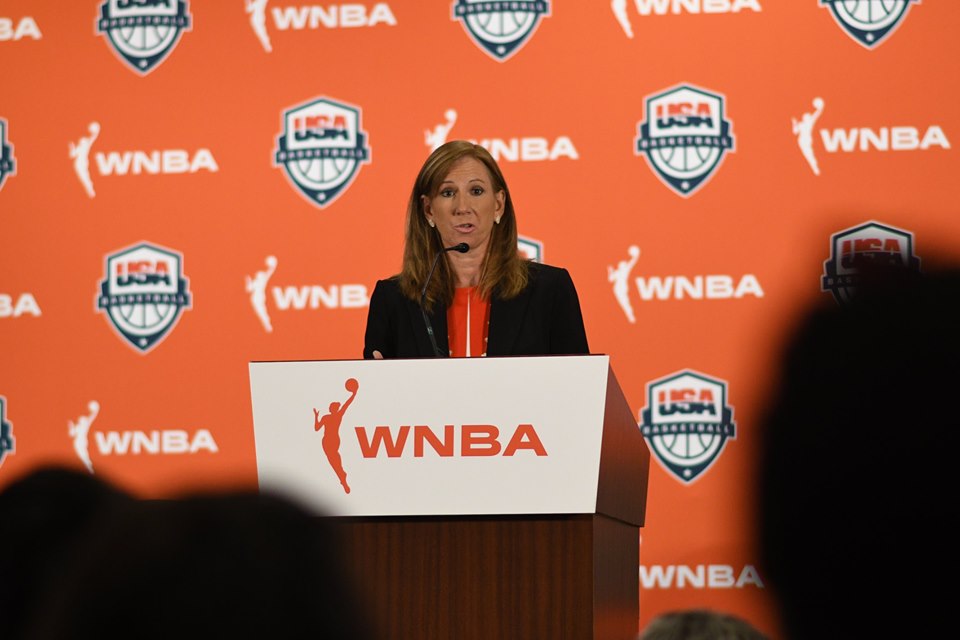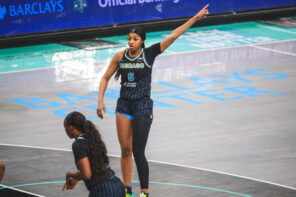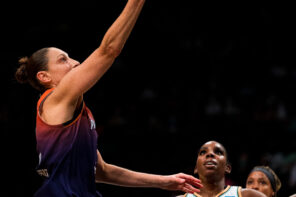We had to know the WNBA was up to something a few years ago when it tapped Cathy Engelbert to take on the role of first-ever commissioner as opposed to simply a “league president.”
After all, Engelbert is not simply any business figure. She once was the CEO of one of the country’s Big 4 accounting firms in Deloitte.
Apparently while much of the WNBA family was hounding Engelbert on if the W will expand anytime soon, apparently Engelbert was up to something else – working her connections in the business community.
Today, the WNBA announced a great expansion of its bank account with a $75 million capital raise, aimed at sustaining the long-term future of the league as well as shaping its business outlook for the long run.
Our strategy is to deploy this capital to continue to drive the league’s brand as a bold, progressive entertainment and media property that embodies diversity, promotes equity, advocates for social justice, and stands for the power of women. Having just completed our historic 25th season, with this access to additional capital, we are setting the WNBA up for a successful future and it represents a sign and signal of the future direction of women’s sports as a whole.
–Cathy Engelbert, WNBA commissioner (release)
The investors reads like a who’s who of top-tier businesswomen and businessmen – one whose names probably appear regularly in business print and online publications. Among them are WNBA and NBA owners as well as former WNBA and NBA players.
They include Joe and Clara Wu Tsai (New York Liberty, Brooklyn Nets), Herb and Steve Simon (Indiana Fever, Indiana Pacers), Ted Leonsis (Monumental Sports and Entertainment, Washington Mystics, Washington Wizards, Washington Capitals), Mark Walter and Eric Holoman (Los Angeles Sparks), Bill Cameron and Brad Hilsabeck (Dallas Wings), Linda Henry (Boston Red Sox, Boston Globe, NESN, Liverpool FC), Dee Haslam and Whitney Johnson (Cleveland Browns), Ginny Gilder (Seattle Storm), Michael and Susan Dell (San Antonio Spurs), Micky and Nick Arison (Miami Heat) as well as former WNBA/NBA greats Swin Cash, Pau Gasol and Baron Davis.
Also among those who have made an investment? One of the WNBA’s three Changemakers in Nike.
Nike has always been more than a sponsor with the WNBA – we’re a strategic partner. And we’re proud to be part of a movement to redefine the future of sport for a new generation – for WNBA players, fans and girls.
–Sonja Hemming, VP, North America League Partnerships, Nike, Inc. (press release)
Shortly after the announcement became news, Engelbert held a media availability session via conference call. There she fielded a number of questions – included one from us at Beyond The W on what it means for other women’s sports leagues for the WNBA to set a standard.
Cathy Engelbert on deal’s impact on women’s sports: “The #WNBA is always leading. That’s why it’s such a great role for me. Today is one of those days that the WNBA is setting the standard. Lots of people are interested in how we’re going to deploy this capital.” (Q @AkiemBailum)
— Myles (@MylesEhrlich) February 3, 2022
One of the noteworthy frustrations fans have with the WNBA is the lack of availability of merchandise. This was especially seen last season when the W rolled out its new set of Explorer and Rebel jerseys (the Heroines were not made for sale).
Asked Commissioner Engelbert about jersey availability. Here is my question and her full response: pic.twitter.com/h0gi4RHxGb
— Owen Pence (@OwenPence) February 3, 2022
Simply put – every player on every team should have its jersey available for purchase. Every day that is not the case, the W and its 12 teams are fumbling the bag instead of securing it.
The most legitimate question one can ask about the WNBA’s new $75 million windfall is where will Engelbert and the league put its newfound Benjamins. The Tsais have mentioned the need to address WNBA travel issues. Liz Cambage mentioned travel in her viral tweet ripping the W for shortcomings on money and travel.
For context, here was my question pic.twitter.com/zKRVDRiSUU
— Myles (@MylesEhrlich) February 3, 2022
Jackie Powell of Bleacher Report and the Liberty beat for The Next also asked Engelbert a question on how this will enhance the overall experience for players.
Cathy Engelbert: “This is something, when you’re trying to transform a league and grow revenue, this will be a huge benefit to the players in our economic model.” Referenced endorsements and in-season competitions/prize pools (salaries are locked in by CBA) (Q @ClassicJpow) #WNBA
— Myles (@MylesEhrlich) February 3, 2022
With the new $75 million capital raise announcement, the WNBA and its 12 teams are now valued collective at $1 billion. That is $1 billion with a B dollars and that is roughly close to what the least valuable NBA team is worth.
Do not let get the story twisted, the WNBA is continuing to have money flowing into it. Ask the Tsai family and the investment Joe and Clara Wu are already investing into the Liberty. Ask Mark Davis of the Las Vegas Aces and how he has already invested money into shelling out the richest contract for a head coach in league history to Becky Hammon.
Davis is also planning on building a training camp facility for the Aces in the Las Vegas suburb of Henderson and, per team president Nikki Fargas at Hammon’s introductory press conference, a possible Aces-centric arena.
It is great that the WNBA has proven that it can attract investors. There are plenty of (sexist) detractors within the business world who love to lament that there is no money in the WNBA. A $75 million investment plus a $1 billion valuation is anything but chump change.
At least we now know what it would be worth if someone were to purchase a team. Translation – the dollar amount is anything but cheap. Engelbert has upped the price – as it should be.
Now that the WNBA has indeed secured the bag in a big way, hopefully this money is used wisely in the ways that it ought to be used.
The expansion issue, the charter flight issue, the marketing issue and the merchandise issues all need to be addressed between Engelbert and the league’s 12 teams the next time the commissioner has a chance to talk about this partnership. The group of investors that Engelbert has brought together from the business world, which includes WNBA and NBA owners as well as former basketball greats such as Cash, Davis and Gasol all prove that they believe in the WNBA and where it can go when done right.
There are plenty of deep-pocketed businesspeople, as the Davis and Tsai examples show, that believe in the WNBA. Now, it is up to the W to listen to its players and prove it believes in itself.
Look at what Athletes Unlimited has accomplished in simply the short time it has had a basketball program. Those that are financially backing Athletes Unlimited’s foray into women’s basketball have clearly shown through their investment in an arena, investment and merchandise and investment bring along the Black women signature names of the women’s basketball media ecosystem that women’s basketball does not have to be presented as a low-budget enterprise. The WNBA ought to take some notes from Athletes Unlimited and apply those to the upcoming 2022 season and beyond.
Another element to this newfound money that the WNBA can use to its advantage is globalization – Engelbert was asked about this as well during the conference call.
Cathy Engelbert: “I look at other sports leagues that are very global, like the NBA, soccer. We have not globalized previously. We have enormous opportunity for consumption of our game, whether it’s in media, sponsorship, or grass-roots programs.” (Q: @benpickman) #WNBA
— Myles (@MylesEhrlich) February 3, 2022
Ben Pickman of Sports Illustrated had that query.
Something tells us that WNBA players would be much more on-board with league-backed globalization efforts as opposed to those that practically says players had to travel overseas so they could make more money as opposed to the salaries they are currently making in the WNBA.
These are the best women’s basketball players on the planet – and it is proven in every international competition that Team USA participates in. They should be paid and treated as such and hopefully this newfound gold mine the WNBA has struck will hopefully help in those efforts.
In many ways, all Engelbert has to do is collaborate with the players on what the league wants to do from a globalization perspective. After all, so many of the players already are familiar with international markets either through their backgrounds or through their time playing with overseas teams such as Dynamo Kursk, UMMC Ekaterinburg or teams in Australia’s WNBL.
Engelbert would be smart to consult with Nneka and Chiney Ogwumike as well as Arike Ogunbowale and reigning Rookie of the Year Michaele Onyenwere on how to grow the WNBA’s brand in Nigeria and the rest of Africa. What about Cambage and Australia? Or Emma Meesseman and Belgium or Amanda Zahui B. and Sweden or Han Xu and China or Kia Nurse and Natalie Achonwa in Canada. It can take plenty of pages from the late, great David Stern, the individual credited with launching the WNBA, on how he made the NBA into an international brand.
In many ways, the announcement of the $75 million in capital gains is an unlocking of an achievement for the WNBA – prove that a women’s sports league can have money flowing into it and that it is a smart investment to, as the WNBPA says, to Bet On Women.
There is no better time than now for the WNBA be smart with its newfound cash – and to bet on itself.




